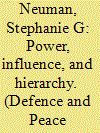| Srl | Item |
| 1 |
ID:
106770


|
|
|
|
|
| Publication |
2011.
|
| Summary/Abstract |
This article examines the post-Cold War transformation of defence industries in six East-Central European (ECE) countries, all former members of the Warsaw Pact and now members of the European Union and NATO. In the past, the arms industry was one of the pillars of the region's economic and political systems. In the past twenty years the region has gone through a profound transformation that brought fundamental changes in its defence industry. After painful adjustment a renewed arms sector, which is partially integrated into today's global arms production system, emerged. Although its size and prominence declined everywhere, this comparison reveals two distinct regional models, illustrated here by the Polish and Hungarian experiences. In Poland and similar countries the crucial importance of the defence industry was confirmed, whereas in Hungary and similar countries the industry's role has eroded. The ECE experience highlights the crucial role that defence industrial policy still plays in the sector's development. But the article also concludes that arms industry policy is not a suitable tool for national economic policy or management of economic crises.
|
|
|
|
|
|
|
|
|
|
|
|
|
|
|
|
| 2 |
ID:
095042


|
|
|
|
|
| Publication |
2010.
|
| Summary/Abstract |
The global defense-industrial sector reflects the hierarchy of power in the post-Cold War world. As in the larger international system, the United States plays the dominant role in the defense sector as well. It is a comparative advantage often used by US policymakers to influence the foreign policy behavior of other states. Curiously, the radical concentration of the world's defense industrial sector, as described here, has received relatively little scrutiny from either academia or the media, even though it not only reflects the international order but provides the United States with considerable leverage in it.
|
|
|
|
|
|
|
|
|
|
|
|
|
|
|
|